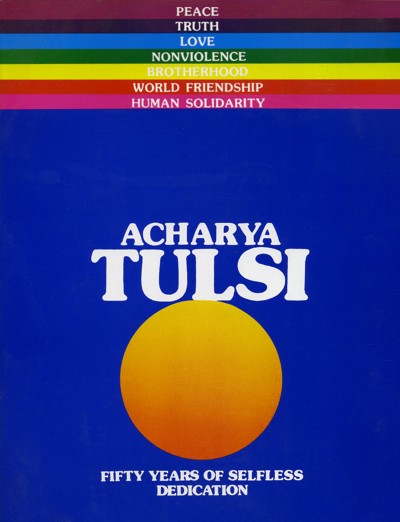Sumnesh Joshi
An eminent litterateur
The fact of Acharya Tulsi heading some particular sect of creed notwithstanding, in the history of modern India he will be remembered as the architect of the Renaissance of moral values in our national life. Besides Mahatma Gandhi, he is the only other Indian who has in a determined manner deployed thousands of his ascetic and selfless monks in every nook and corner of India in order to stem the tide of immorality. They have spread out in all directions with the single object of ensuring that man's life is cleansed of all impurity that truth and integrity permeate man's daily life and that individual purity encourages the growth of a religious temperament.
Such a crusade for building character transcends all banners - religious, sectarian and ideological. It is secular in the best sense of the word and is aimed at all sections and classes. No wonder more and more people are getting attracted towards this great crusader for character-building.
In post-Gandhi India there was a sharp decline in morality. This, together with the pressures generated by the Second World War, resulted in the erosion of spiritual faiths and in the rise of gross materialism. It was against the above background that Acharya Tulsi gave to the nation a new revolutionary way in the form of Anuvrat.
Whenever cherished ideals of society suffer eclipse, great sages and seers
ffer to the erring people a message and method of hope and of scaling the heights of excellence. The Anuvrat code of conduct performs precisely the same function.
Acharya Tulsi has put before the people a Middle Path - a path that is free from all dangers, that does not insist on total compliance with truth or on total renunciation of evil. Anuvrat enjoins unswerving devotion to one's duty on the people irrespective of their work or status and opens the possibility of self-purification. In this sense Anuvrat is the most practical programme of leading the country towards moral amelioration.
Anyone given to practising religion as a means of self-purification rids himself of all malice, ill-will and bad behaviour and develops a feeling of friendliness, tolerance and sympathy. Such a moral transformation overcomes narrow sectarianism practised in the name of religion.
Thus, Acharya Tulsi has made Anuvrat much more than a mere means of individual reform - he has made it an instrument of social reform. Its nationwide acceptance has brought within its fold students, government employees, women, political parties, election commissions and many other sections of society comprising both the poor and the rich, the high and the low. A campaign or a movement of this magnitude needs devoted workers and Acharya Tulsi's innumerable monks are carrying it out in every part of the country. All this is being done merely on the basis of a strong moral commitment and determination and without any official or state apparatus.
Acharya Tulsi preaches self-control and next to Mahatma Gandhi he has instilled the message of sacrifice, non-possession and self-restraint into our national consciousness. His motto sanyamah khalu jeevanam (life means self-restraint) is reverberating throughout the nation. Never before did the country need his thoughts and philosophy more than now. The path of Anuvrat is the only path that can lead us from darkness to light, from ignorance to knowledge and from immorality to morality. A thousand salutations to this great man! May he live for ever!
